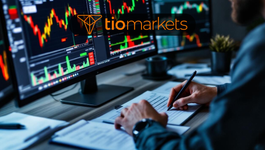How to Choose the Right Broker for Your Trading Needs
BY TIOmarkets
|mayo 20, 2024When it comes to trading, finding the right broker is crucial. A broker acts as an intermediary between you and the financial markets, allowing you to execute trades and manage your investments. With so many options available, it can be overwhelming to choose the right one that meets your specific trading needs. In this article, we will discuss the factors to consider when selecting a broker and the different types of brokers available. By understanding your trading needs and conducting proper research, you can make an informed decision and set yourself up for success in the trading world.
Understanding Your Trading Needs
Before you dive into the world of brokers, it's essential to identify your investment goals, assess your risk tolerance, and determine your trading style. These factors will help you understand what you need from a broker and guide you in making the right choice.
When it comes to investment goals, it's not just about making money; it's about defining what success looks like for you. Are you aiming for financial independence, saving for a specific milestone like retirement or a new home, or simply looking to grow your wealth? Clarifying your investment goals will give you a clear direction when choosing the right broker and investment strategies.
Identifying Your Investment Goals
Are you looking to generate short-term profits or build a long-term portfolio? Knowing your investment goals will help you determine the types of assets you want to trade and the level of risk you are willing to take.
Furthermore, assessing your risk tolerance involves not only understanding how much risk you are comfortable with but also considering your financial situation, time horizon, and overall investment objectives. It's crucial to strike a balance between risk and reward that aligns with your personal circumstances and long-term aspirations.
Assessing Your Risk Tolerance
Understanding how much risk you can handle is crucial in selecting a broker. Some brokers specialize in high-risk investments, while others cater to conservative traders. Assessing your risk tolerance will help you narrow down your choices and find a broker that aligns with your comfort level.
Lastly, your trading style reflects how you interact with the market and execute your trades. Whether you are a day trader, swing trader, position trader, or investor, your trading style is a key factor in determining the most suitable broker for your needs. Different trading styles require different tools, platforms, and support from brokers to effectively implement your strategies and achieve your financial goals.
Determining Your Trading Style
Are you a day trader who executes multiple trades in a single day, or do you prefer a more hands-off approach? Your trading style will impact the features and tools you look for in a broker.
The Role of a Broker in Trading
A broker's functions and responsibilities go beyond simply executing trades on your behalf. They provide a range of services and play a crucial role in your trading journey.
Brokers act as intermediaries between buyers and sellers in the financial markets. They facilitate the buying and selling of various financial instruments such as stocks, bonds, commodities, and currencies. In addition to executing trades, brokers also provide market insights, analysis, and recommendations to help clients make informed investment decisions.
Broker's Functions and Responsibilities
A broker should offer a user-friendly trading platform, provide access to a wide range of financial instruments, and offer competitive pricing. They should also provide educational resources and research tools to help enhance your trading knowledge.
Furthermore, brokers offer personalized customer support to assist clients with any trading-related queries or issues. They may also provide risk management services to help clients mitigate potential losses and protect their investment portfolios.
Importance of a Reliable Broker
Reliability is a key factor when choosing a broker. You want to ensure that the platform is stable and secure, and that your trades will be executed promptly and accurately. A reliable broker will safeguard your investments and provide peace of mind.
Moreover, a reputable broker adheres to strict regulatory standards and maintains transparency in all its dealings. This ensures that clients' funds are secure and that the broker operates with integrity and professionalism. By choosing a reliable broker, traders can focus on their trading strategies and financial goals with confidence.
Factors to Consider When Choosing a Broker
There are several factors to consider when selecting a broker. By evaluating these factors, you can narrow down your options and find the broker that best suits your needs.
One crucial factor to add to your list is the broker's regulatory compliance. It is essential to ensure that the broker is regulated by a reputable financial authority. Regulation helps protect your funds and ensures that the broker operates within strict guidelines, providing you with a level of security and transparency.
Broker's Reputation and Credibility
Research the broker's reputation and credibility in the industry. Look for reviews and testimonials from other traders. A reputable broker will have a track record of providing excellent service and fair practices.
Additionally, consider the broker's longevity in the market. A broker that has been in operation for a significant period is likely to have more experience and stability. This can be reassuring, especially when entrusting them with your investments.
Trading Platform and Tools
The trading platform is your gateway to the financial markets. It should be intuitive, easy to navigate, and offer a wide range of tools and features to assist you in your trading analysis and decision-making process.
Look for a broker that provides educational resources and market analysis tools within their platform. These resources can help you stay informed about market trends and make more informed trading decisions.
Fees and Commissions
Consider the fees and commissions charged by the broker. While lower fees are generally preferable, it's important to weigh them against the broker's overall offering. Look for transparent pricing and understand how fees may impact your trading profitability.
Some brokers may offer different account types with varying fee structures. Assess your trading style and frequency to determine which account type aligns best with your needs and budget.
Customer Service and Support
Having access to reliable customer service and support is vital. Look for a broker that offers responsive customer support, whether it be through phone, email, or live chat. Prompt and knowledgeable assistance can make a significant difference when you encounter trading issues or have questions.
Furthermore, consider the availability of educational resources and training provided by the broker. A broker that invests in your knowledge and skills as a trader can contribute to your long-term success in the financial markets.
Types of Brokers
There are different types of brokers available, each offering unique services and catering to different types of traders. Understanding the differences will help you choose the right one for your trading needs.
Full-Service Brokers
Full-service brokers provide a wide range of services, including investment advice, research reports, and portfolio management. They are suitable for investors who prefer a more hands-off approach and are willing to pay higher fees for personalized guidance.
Discount Brokers
Discount brokers offer self-directed trading and charge lower fees. They provide the necessary tools and resources for independent traders, but typically do not offer investment advice. Discount brokers are ideal for experienced traders who prefer more control over their investments.
Online Brokers
Online brokers operate entirely over the internet, offering trading platforms that allow you to execute trades independently. They provide a wide range of financial instruments and often have competitive pricing. Online brokers are suitable for self-directed traders who want flexibility and convenience.
By considering your trading needs, researching brokers, and evaluating the factors discussed in this article, you can choose the right broker that aligns with your goals and preferences. Remember, finding the right broker is a crucial step towards achieving success in your trading journey. Happy trading!
Start Trading with TIOmarkets
Ready to take the next step in your trading journey? With TIOmarkets, you get access to a top-rated forex broker and online trading platform. Trade over 300 instruments across 5 markets, including Forex, indices, stocks, commodities, and futures, all with low fees. Join the 170,000+ traders from over 170 countries who have already opened accounts with us. Enhance your trading skills with our comprehensive educational resources and step-by-step guides. Don't wait any longer to optimize your trading experience.
Create a Trading Account today and start trading the smart way with TIOmarkets.

Risk disclaimer: CFDs are complex instruments and come with a high risk of losing money rapidly due to leverage. You should consider whether you understand how CFDs work and whether you can afford to take the high risk of losing your money. Never deposit more than you are prepared to lose. Professional client’s losses can exceed their deposit. Please see our risk warning policy and seek independent professional advice if you do not fully understand. This information is not directed or intended for distribution to or use by residents of certain countries/jurisdictions including, but not limited to, USA & OFAC. The Company holds the right to alter the aforementioned list of countries at its own discretion.
Join us on social media

Behind every blog post lies the combined experience of the people working at TIOmarkets. We are a team of dedicated industry professionals and financial markets enthusiasts committed to providing you with trading education and financial markets commentary. Our goal is to help empower you with the knowledge you need to trade in the markets effectively.
Related Posts





